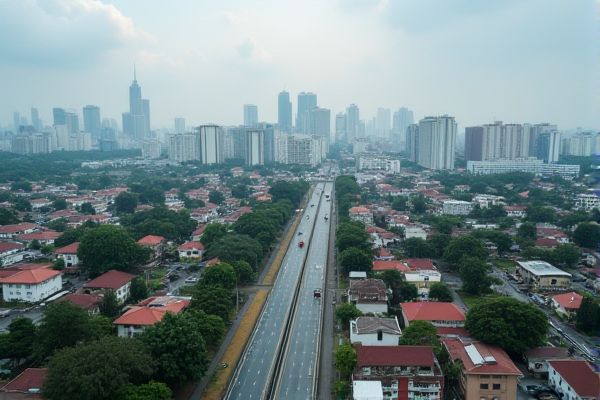
Social and community groups in Indonesia: Pancasila ideology is foundational. Strong family-centered culture. Predominantly Muslim population. Close-knit community ties. Active in religious activities. Tradition-focused social events. Emphasis on mutual assistance. Youth organizations are popular. Diverse ethnic community groups. Language groups vary regionally.
Pancasila ideology is foundational.
Pancasila, the foundational philosophical theory and state ideology of Indonesia, plays a crucial role in maintaining national integration and unity among diverse social and community groups. It is composed of five principles: Belief in the one and only God, Just and civilized humanity, The unity of Indonesia, Democracy guided by inner wisdom, and Social justice for all the people of Indonesia, promoting inclusivity, mutual respect, and cooperation. For more information, please visit the detailed page on Pancasila, which elaborates on its significance in fostering harmony and progress within the nation.
Strong family-centered culture.
In Indonesia, the culture is strongly family-centered, emphasizing collective family responsibility, loyalty, and respect for elders. Children are expected to care for their elders and contribute to the family's well-being, with family honor and social status being paramount. For more insights into these traditional values, you can explore the Indonesian Culture where these norms are comprehensively discussed.
Predominantly Muslim population.
In Indonesia, the predominantly Muslim population is significantly influenced by two major Islamic organizations: Nahdlatul Ulama (NU) and Muhammadiyah. Nahdlatul Ulama, founded in 1926, is the largest Islamic organization in the world and is characterized as traditionalist, accepting local cultural traditions that do not conflict with Islamic law. Muhammadiyah, on the other hand, is reformist, taking a more literal interpretation of the Qur'an and Sunnah. Both organizations play crucial roles in education, healthcare, charity, and community development and have extensive structures including women's, youth, and students' wings.
Close-knit community ties.
In Indonesia, close-knit community ties are a cornerstone of the culture, with families often living together across multiple generations and communities practicing mutual assistance and cooperation, such as through the tradition of gotong-royong and decision-making by consensus (musyawarah-mufakat). This emphasis on community and social harmony is deeply ingrained, reflecting the collective and communal nature of Indonesian society. For more insights on this vibrant culture, visit The Culture Trip which delves into the traditions and practices that define Indonesian life.
Active in religious activities.
In Indonesia, various social and community groups are active in religious activities, with the majority of the population being Muslim and organizations like Muhammadiyah and Nahdlatul Ulama playing significant roles. Other notable groups include the Communion of Churches in Indonesia (PGI), which addresses national issues related to Christian communities and promotes interfaith harmony.
Tradition-focused social events.
In Indonesia, tradition-focused social events include cultural festivals like the Balinese Day of Silence (Nyepi), the Java Jazz Festival, and the Toraja Harvest Festival, as well as community events such as Local Market Festivals and Community Clean-Up Days, which celebrate and preserve local traditions, foster community unity, and support local economies. These events not only showcase Indonesia's rich cultural heritage and diverse traditions but also attract both locals and visitors. If you're interested in exploring more about these types of events, you might want to check out the detailed article on Alcor Prime, which delves into the different kinds of events celebrated around the world.
Emphasis on mutual assistance.
In Indonesia, mutual assistance is deeply embedded in the culture, particularly through traditions like Marsiadapari and Gotong Royong. These practices emphasize community empowerment, togetherness, and volunteerism, often manifesting in activities such as agricultural help, celebrations, and support during misfortunes or disasters, highlighting the importance of collective action and Social Capital.
Youth organizations are popular.
Youth organizations in Indonesia, such as the Indonesia Youth Foundation, Indonesian Youth Opportunities in International Networking (IYOIN), and Indonesian Youth Diplomacy, are prominent for providing education, resources, and international exposure to empower the country's youth and help them realize their full potential. These organizations focus on connecting youth globally, improving education, and promoting diplomacy and community involvement. For more information about these impactful initiatives, visit the Borgen Project website, which highlights various programs that are instrumental in shaping the future of Indonesian youth.
Diverse ethnic community groups.
Indonesia is home to over 600 ethnic groups, with the Javanese being the largest, making up about 40% of the population. Other significant groups include the Sundanese, Malays, Batak, Madurese, Betawi, Minangkabau, and Bugis, each contributing to the country's rich cultural diversity with their unique traditions, languages, and customs. This incredible tapestry of cultures and peoples is well-documented on the Ethnic Groups in Indonesia page, providing insights into how these diverse communities coexist and thrive within the nation.
Language groups vary regionally.
In Indonesia, language groups vary significantly across different regions, with over 700 living languages spoken, including major indigenous languages like Javanese, Sundanese, and Minangkabau in the western and central areas, and distinct Papuan languages in the eastern regions such as Papua and the Maluku Islands. These languages are categorized into various families, including Austronesian and Papuan, with regional lingua francas like Malay and local dialects connecting different ethnicities.
